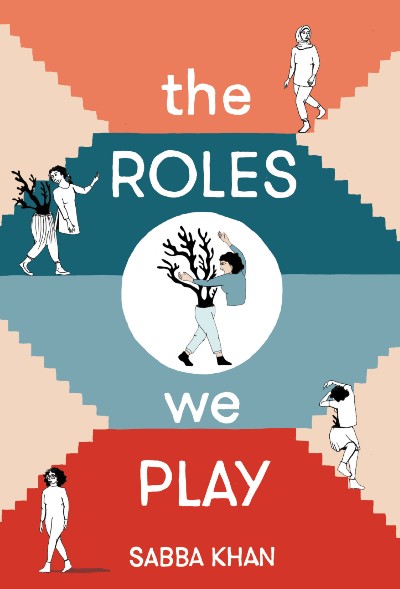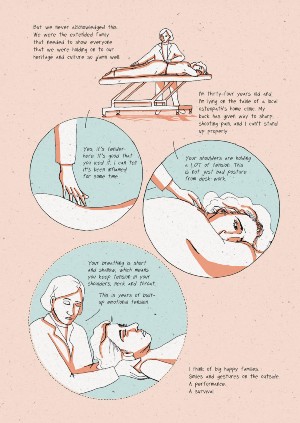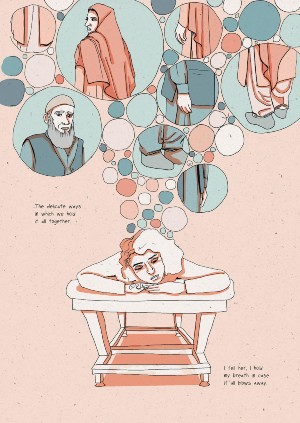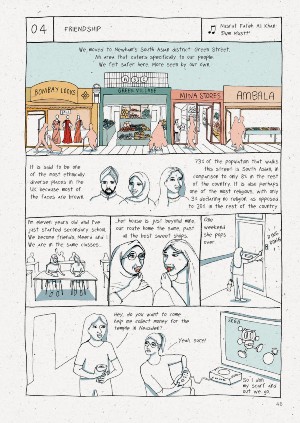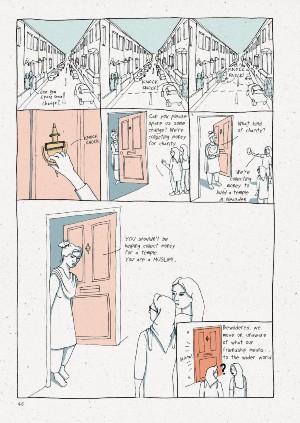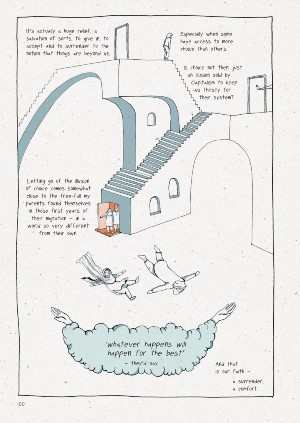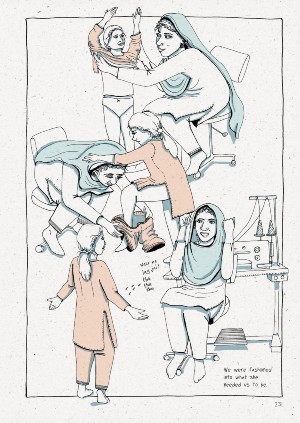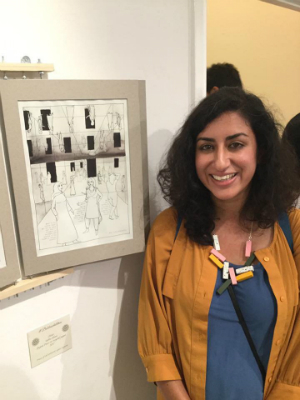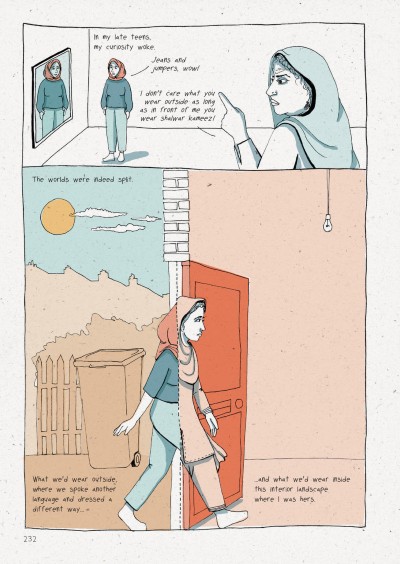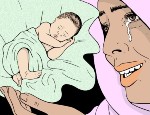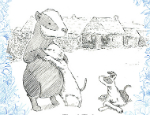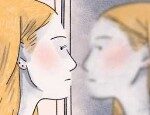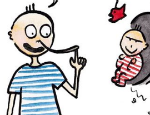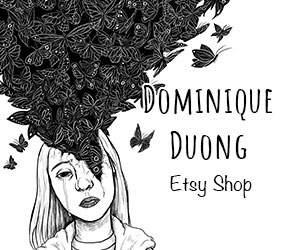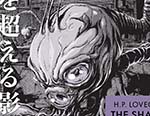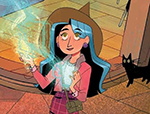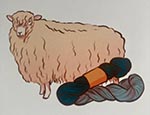To a certain extent I have been fortunate enough to have had something of a unique perspective on the development of the comics practice of Sabba Khan, whose debut long-form work The Roles We Play was published this week by Myriad Editions. If I’m not mistaken I believe I was the first reviewer to write about her comics way back in 2015 and have been following her creative journey over the following years through her self-publishing endeavours, exhibitions and as one of our mentored 2017 Broken Frontier ‘Six Small Press Creators to Watch’.
I initially discovered Khan through her earliest, more whimsical. self-published comics. But it was her One Beat Zines’ Identity anthology contribution that underlined her potential to me in just 6 short pages. I spoke then at Broken Frontier of that affecting piece of autobio and of how resonantly she used “moments of quieter symbolism with some compelling visual metaphor [to give] the reader an insight into the conflicting pull of two cultures on her sense of self.”
Khan’s work “explores first-world city life as a second-generation Kashmiri Muslim migrant” and The Roles We Play was shortlisted for the Myriad First Graphic Novel Competition in 2018. This much awaited graphic memoir vastly expands on the themes of her previous short form comics (indeed longer-term followers of Khan will spot some of those anthology and exhibition pieces slightly retooled and incorporated into the longer narrative herein). While The Roles We Play is ostensibly a graphic essay for Khan to examine her own identity, culture and finding her place in the world, it is also takes in wider generational considerations. Particularly in relation to the historical events that have resulted in the majority of the British Pakistani diaspora’s origins being linked to Mirpur, an area that disappeared underwater as a result of a post-Partition dam, and led to inevitable mass migration.
As I have said before at Broken Frontier sometimes the very best autobio comics are those that feel like they have been created as much, if not more, for their authors as for an audience. What is immediately appealing about Khan’s approach in The Roles We Play is that we feel from the outset that we are being invited to join her in a pseudo-real time interrogation of self; that her discoveries are, in turn, our discoveries one step removed. It’s this sense of intimacy, cultivated by Khan’s unflinching candour, that draws us so fully into the book.
Indeed in early pages she offers us an incredibly open and often very raw account of her childhood. One where individual identity was subsumed into the greater familial identity; where the cultural dynamics of mother-daughter-sister relationships were sometimes complex, sometimes comforting, and sometimes intense; and where patriarchy is a constant lingering presence. There’s a constant sense of fragility to her narrative, a delicateness, a vulnerability… and yet there is also an undeniable inner strength in Khan’s confronting the echoes of the past, however trepidatious she clearly feels about that process.
That conflict between fitting in and belonging is one of The Roles We Play’s most prominent themes. It’s juxataposed with flashbacks to the story of her mother’s life in early Partition era India and the perceived status of her parents as almost pioneers when they moved to London. It’s also inextricably interconnected with another similar question of where/what is home and how do we define that? How much are we a product of our environments and conversely in turn to what degree do we shape them?
Throughout, she is uncompromisingly honest about how this quest for identity and understanding can overwhelm and oppress her. In attempting to reconcile the many different aspects of her life – faith, heritage and environment among others – Khan acknowledges a degree of performativity (the titular The Roles We Play) and a kind of fracturing of self. The cyclical shifts between agency, guilt and conformity becoming ever familiar.
Previous work is expanded on, particularly the section covering her decision to relinquish her headscarf (explored before in Identity) and those, like me, who were fortunate enough to see Khan’s work at the Burnt Roti ‘The Beauty of Being British Asian’ exhibition in London in 2017 (below) will recognise her comic from that event nestling within The Roles We Play. The themes of minicomic Motherhood are also an integral part of the book. Inevitably the spectre of racism is never far away. An early scene of being spat at as a child by bigots is as difficult to read as a later one of Khan being accused of being a terrorist in public shortly after the 2005 bomb attacks on the London underground. The latter sees an astonishing use of pacing, a page-turn reveal, white space and minimalism to depict her devastation at the incident with a despairing potency.
Khan has an artistic style that deceives the reader in its elegantly stripped back simplicity. In terms of the mechanics of the form, though, it is extremely sophisticated in its construction and it’s in this seeming incongruity that she forms such an immediate communicative bond with the reader; our empathy assured by its careful combination of accessibility and eloquence. I’ve spoken in the past of Khan’s adoption of quieter symbolism with compelling visual metaphor and it’s this aspect of her storytelling that will perhaps most excite those enthusiasts of the pure language of the form. She is an artist who has always come to the medium without preconceptions of what comics should be and looked at the page as a blank canvas to be exploited. It’s led to a distinctive style of sequential storytelling that, aside from the aforementioned use of visual metaphor, also employs the diagrammatic, the architectural (especially structural cutaways), and experimental panel compositions.
As I continue to say at Broken Frontier, books like The Roles We Play are so important not just for those who may recognise elements of their own lives in Khan’s story but for those of us who need to open ourselves up to the realities of others’ lived experiences. In acknowledging the contradictions in her life, and seeking to reconcile those divisions, Khan takes us on a journey of adaptation, growth, acceptance and discovery. It’s an easy reviewer fallback to talk of books that reward re-reading but this is one that you’ll never stop fully unpacking, unpicking and reflecting upon.
Sabba Khan (W/A) • Myriad Editions, £18.99
Review by Andy Oliver





